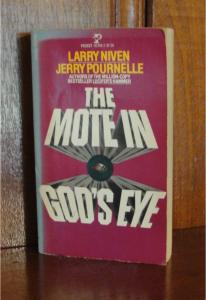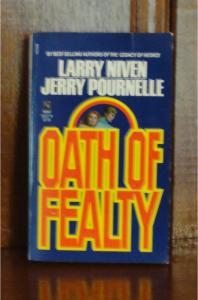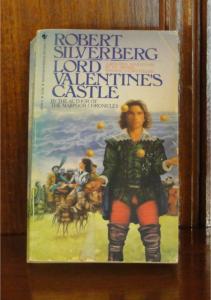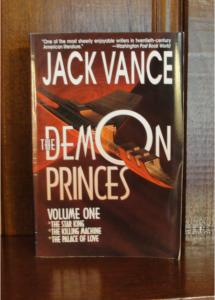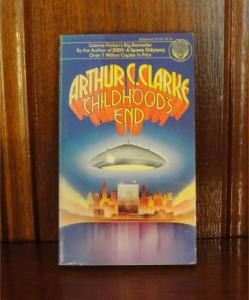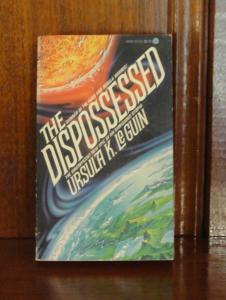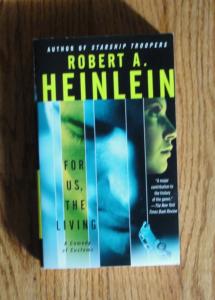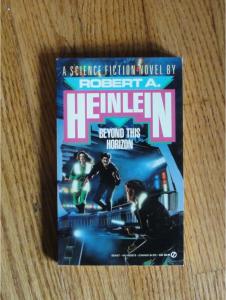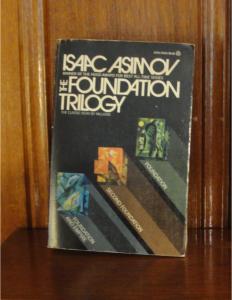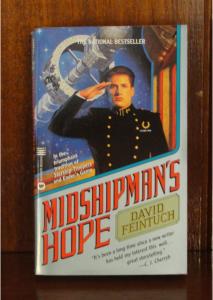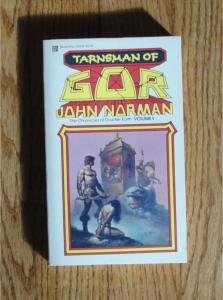Utopian Science Fiction
Utopias. Positive visions of a better world. Sometimes enlightening. Sometimes entertaining. Sometimes disturbing. (Some people have warped ideas of what constitutes "better.") As I originally wrote these reviews for my Quiz2d site, these are arranged by Nolan Chart quadrant. (Note: Some of the images are from my personal collection. If you buy from the links, you make get something that looks different; the actual appearance will be shown on Amazon.)
Libertarian Utopias
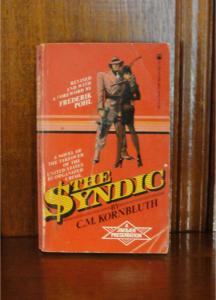
The United States government collapses, the Mafia
fills the void, and there is much rejoicing.
The Syndic
by
C.M. Kornbluth is the earliest example of a libertarian utopia that
I know of. Quite fun. I suspect it inspired the gangster episode of the original
Star Trek, but this is speculation
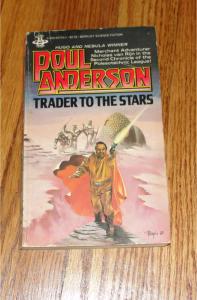
Imagine if Ayn Rand had a sense of humor
– and history. You might end up with something like Poul
Anderson’s Polesotechnic League stories, especially those
featuring Nicholas van Rijn:
Trader to the Stars
and
The Man Who Counts
.
Perhaps the quintessential libertarian utopia is The Moon is a Harsh Mistress
If you want an undiluted libertarian utopia that doesn’t play fair at all, try L. Neil Smith’s The Probability Broach
Norman Spinrad gives the market based arbitration of The Moon is a Harsh Mistress an eco-hippie vibe in Songs From the Stars
Social Liberal Utopias
Civil liberties, feminism, free love, and/or legal drugs – with a cuddly welfare state to keep it all safe. It sounds like fun, and yes, I have a few fun reads for you. Given the subject matter, many of the reads are not all suitable for the young, and I cannot endorse some of the morals, herein. Caveats aside, here we go:
Norman Spinrad’s
Child of Fortune
[18+] is a coming of age story in a hedonic star-faring
future where one is expected to be a wandering hippie before
deciding upon a career. To do otherwise is to be a wage slave. This
novel features some of the most beautiful writing ever in science
fiction, with a future language that blends German and Sanskrit
into English. College lit professors should definitely check this
one out. The story also portrays a very interesting approach to
welfare suitable for a minimalist state, that is worth studying
regardless of whether you accept Spinrad’s hedonism or
not.
Beautiful princess needs barbarian warrior to help
her save the empire so she comes to earth to recruit the hero of
the story – a Vietnam War veteran. The first half of Robert
A. Heinlein’s
Glory Road [17+] is a fun twist on sword
and sorcery fiction. The second half is the hero’s struggle
to live happily ever after in what Heinlein considers to be a truly
civilized world, a world which regards the U.S. of the early 1960s
much as we in the West regard the Middle East today.
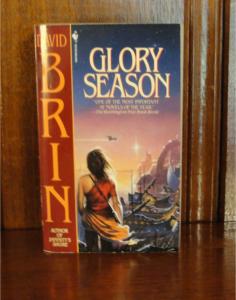
Finally, for the feminists in the audience, we
have an interesting take on sustainable peace through extreme
feminism in Glory Season
by David Brin. This is not a true
utopian novel, as the author criticizes the society he invents as
much as he praises it. But the mechanism by which he makes the
society sustainable is so interesting that I have to include this
somewhere.
Conservative Utopias
Conservatism connotes many different things: church, capitalism, limited government, nationalism, tradition, acceptance of inequality, rule of law, disdain for unrestrained democracy, and even once included environmental conservation. So I have cast a rather large net to capture idealized conservative societies.
A good place to start would be Niven and
Pournelle’s
The Mote in God's Eye
On the
surface it is an alien first contact story with a twist: a far
flung human empire finds the aliens, yet the alien civilization is
older are more advanced. The story is well worth reading for having
one of the most well imagined alien races ever penned. But I
include it here for the very conservative human civilization which
mixes aspects of the British Empire and ancient Sparta. Jerry
Pournelle went on to backfill how this civilization arose from a
collapsing welfare state in books such as
High Justice
,
Exile and Glory
, and quite a few
others (some with collaborators).
Crime is out of control in the cities,
so the upper middle class is moving into giant managed
megabuildings to escape the chaos. Such is the backdrop of
Oath of Fealty
another Niven-Pournelle
collaboration. The work asks how much privacy would you be willing
to give up in order to have full security? And it suggests how a
new feudalism could arise from a dysfunctional democratic society
if we are not careful.
Much like Ronald Reagan, Robert Heinlein
went from ultra left-liberal to somewhere between conservative and
libertarian after seeing communism in action.
Starship Troopers
is Heinlein at his most conservative. Unlimited
democracy leads to corruption; the solution is having to
earn the right to vote. The Arachnids are out to get
humanity; the solution is a crack volunteer army with
brutally realistic training. (The book is largely a critique of how
we fought the Korean War.) I don’t agree with all of
Heinlein’s recommendations in this book, but it’s a
great read and quite thought-provoking. It’s also a good
antidote for the unrealistic isolationism favored by many
libertarians. (P.S. avoid the movie! Read the book.)
For those of a more religious conservative bent, be sure to read
C.S. Lewis’ Chronicles of Narnia books.
Yes, they are written for kids, but there are plenty of deep
insights and jabs at the progressives for adult readers. Read them
in the correct order. Some boxed sets put The Magician’s
Nephew as the first book, when it should be Book 6. Also: the
second book, Prince Caspian, is not as good as the rest. Do
read it for context, but realize that the books get much
better afterwards.
For a more adult take on C.S. Lewis utopian thinking, read
, the first in his
space trilogy
. The first portrays his utopia, a world where three
different intelligent species coexist. The second is a long
theological rumination. The third is pure attack on the
progressivism of his day – it is a Christian analog of
Atlas Shrugged, featuring many similar villains.
For a non-religious take on the theme of diversity
through non-democratic hierarchy, try Robert Silverberg’s
Lord Valentine's Castle
and its sequels.
For those who would still mix conservation and conservatism, a
great place to start would be with Jack Vance’s works. I
recommend his series,
The Demon Princes,
a
series I have reread multiple times for sheer enjoyment. On the
surface, these are not utopian novels; they are detective/revenge
stories against five extremely quirky master criminals who
destroyed the hero’s colony. But the backdrop of these
stories features a wild array of human civilizations scattered
across hundreds of worlds, civilizations that are truly
human, both for good and ill. There is no overarching empire,
and no Singularity. How this is achieved is truly
interesting…
For a more explicit mix of conservatism and conservation, see
Vance’s
Araminta Station
and its sequels.
For positive conservative portrayals on movies/television, you
generally need to go back to before 1970. Television portrayed an
America where private citizens casually owned weapons, fathers were
wise, free range children explored their neighborhoods
unsupervised, and children had respect for their elders. Even the
liberal shows of the day are conservative by today’s
standards. The original
Star Trek
defended
America’s Cold War, had two anti abortion episodes, and
endorsed Christianity. And, like The Demon Princes, Star
Trek rejected The Singularity as unsuitable for humans. The
only robots are alien, and cause mischief to humans. Attempts at
genetically improving humans proved disastrous in the 20th Century
and were since rejected. Note also the ineffectiveness of
Federation medicine and the limits on the ship’s computer
power. These were intentional plot features, as the crew
encountered post-Singularity civilizations, or the remains thereof,
frequently.
But for the most blatantly conservative utopia on television, break out The Andy Griffith Show. Yes, it is a silly comedy, but silly comedy is perhaps the best way to make a true utopia entertaining. (It’s kind of hard to have true drama when everything is working reasonably well.)
Lefty Utopias
I am not a socialist, and don't play one on TV. But I'm going to include some socialist utopias because:
- I'm a greedy capitalist trying to sell books.
- I think it is good to stretch out the mind and see reality from other perspectives.
And so, some lefty reads, including a couple I had to read for a college course back in the day...
Benevolent space aliens put humans on welfare. Peace, joy and understanding ensue; pesky rednecks and Christians fade away. I find Childhood’s End
The Dispossessed is an honest
utopian novel contrasting an
anarcho-socialist utopia with a propertarian society – a must
read for those who still believe in communism but that the
Bolsheviks did it all wrong (implementing “state
capitalism”).
The early Robert Heinlein was very, very
far to the left. (He moved rightward later in life after touring
the Soviet Union.) For Us, the Living
[17+] was his first
attempt, laying out his vision of free love, free healthcare, and
Social Credit economics in great detail within a not-so-great
story. It was only published after his death.
Beyond this Horizon
was published when written, and includes much of his
early vision of Social Credit economics. It’s still not one
of his best novels, but it is short and readable. It is interesting
to note that even when he was a borderline socialist, Heinlein was
a big proponent of individual gun rights. His socialism was truly
democratic, not elitist.
With a large enough population, individual
actions cancel out and historical forces are almost inevitable,
save for some long range efforts by social science experts. Isaac
Asimov’s The Foundation Trilogy is thus the ultimate
fantasy for the liberal sociology professor. Get paid for rereading
it by assigning it to your students!
(I personally think this trilogy is exremely overrated as literature, and it irks me that lit teachers give this or other Asimov works as examples of science fiction, when there are much better writers to choose from. That said, this is an entertaining work.)
Authoritarian Utopias
Power corrupts, and absolute power…makes for a rather good story. And so, with an evil grin, I present you with a variety of authoritarian utopias. We have variety, because authoritarianism is not a political philosophy, but an infinite collection. Once you opt for mighty government, there is still the question as to what to do with all that might. So peruse the works below, and indulge you inner megalomaniac safely within the confines of your imagination.
Remember the good old days when sea captains had ultimate authority, and a breech of regulations resulted in a good flogging? David Feintuch does, and he envisions a star travelling future combining the “best” aspects of the old British Empire with a bit of Saudi influence thrown in for authoritarian fun in Midshipman’s Hope
Or if you prefer a more gentle vision, try
Thea
Alexander’s 2150 A.D. [18+]: a benevolent New Age computer
guides the population serenely to higher levels of enlightenment.
Given the hedonic nature of this utopia, I could almost place it in
the social liberal utopia category. But given the amount of monitoring,
including clothing that changes color to match your current level
of enlightenment, I need to place it in the authoritarian
category.
If all that feminist New Age enlightenment stuff makes
you sick, how about some full-on endarkenment: Might makes right!
In Tarnsman of Gor [18+] and its many sequels, heroes get
glory and comely lasses, while girly-men (and girlies) get the
chains they deserve. A serious political philosophy, or just grist
for bedroom games? You decide, but do note that the author is a
philosophy professor. Anyway, some of the books are decent science
fiction, reminiscent of Edgar Rice Burroughs, and they are
guaranteed to offend all feminists within a five mile radius.
No list of authoritarian utopias would be complete
without some Nazi vision. So how about science fiction by Adolph
Hitler himself? In The Iron Dream,
Norman Spinrad envisions
an alternate reality where Hitler emigrated to the United States
after the failed Munich Putsch. He then used his artistic skills to
illustrate science fiction magazines and eventually took up writing
himself. Lord of the Swastika is his last and greatest work.
The parallel universe intro remarks and afterward are darkly
hilarious. The novel itself – set in a post nuclear age
populated by mutants – will allow you to think like a Nazi
without hating any extant humans. Indeed, the novel so resembles more
popular heroic fantasies that you may realize that you have already
been indulging your inner Nazi. Disturbing.
Equal time requires a Bolshevik novel. How about
Joseph Stalin’s favorite: Cement by Fyodor Gladkov.
Feel the proletarian solidarity as working class men and women
struggle to get a cement factory working despite bureaucrats and
saboteurs. Utterly unheroic, and a mostly dull read, but if you are
a Bolshevik, you deserve every page. This is the perfect gift for
your Che T-shirt wearing nephew.
(Bonus: compare the opening
scene to that of Atlas Shrugged. The parallels are
ominous.)
Finally, I leave you with a bit of all-American
authoritarianism, from Hollywood. Arresting and trying people for
pursuing happiness incorrectly is just too inconvenient. Shoot them
in the streets! And check out our clothes! Styling!
Miami Vice
is the TV show that inspired the authoritarian "utopia" we
live in today.







